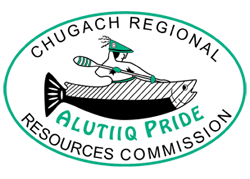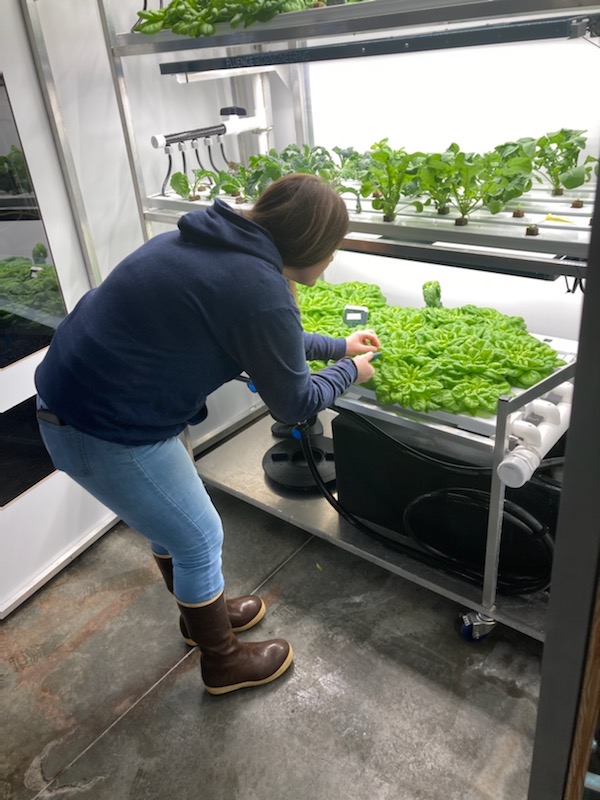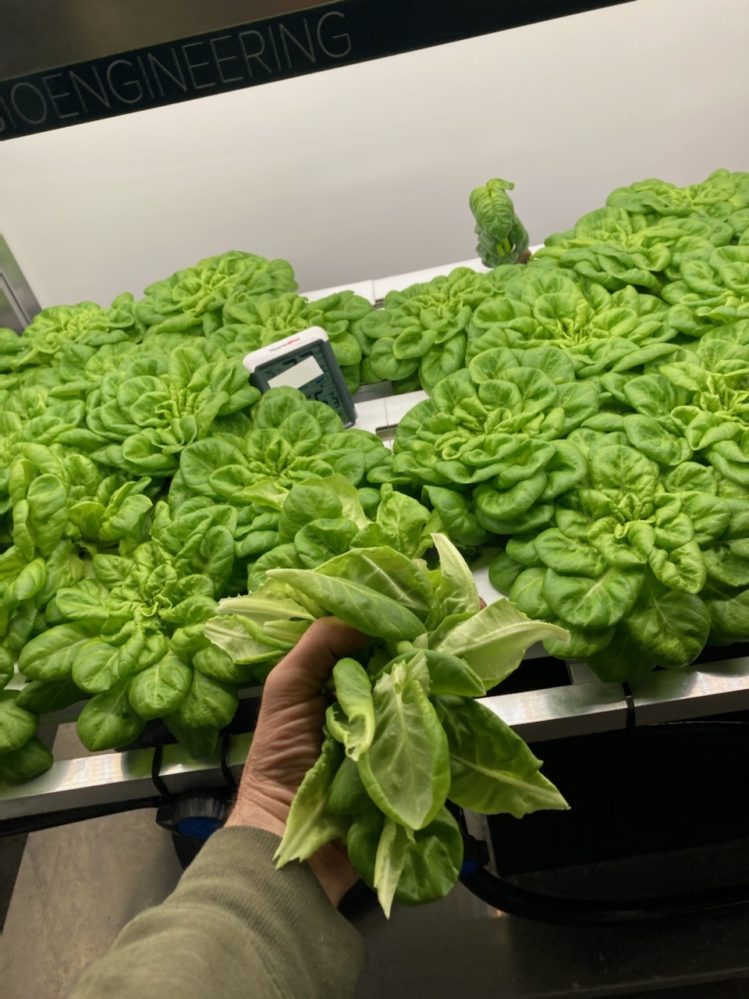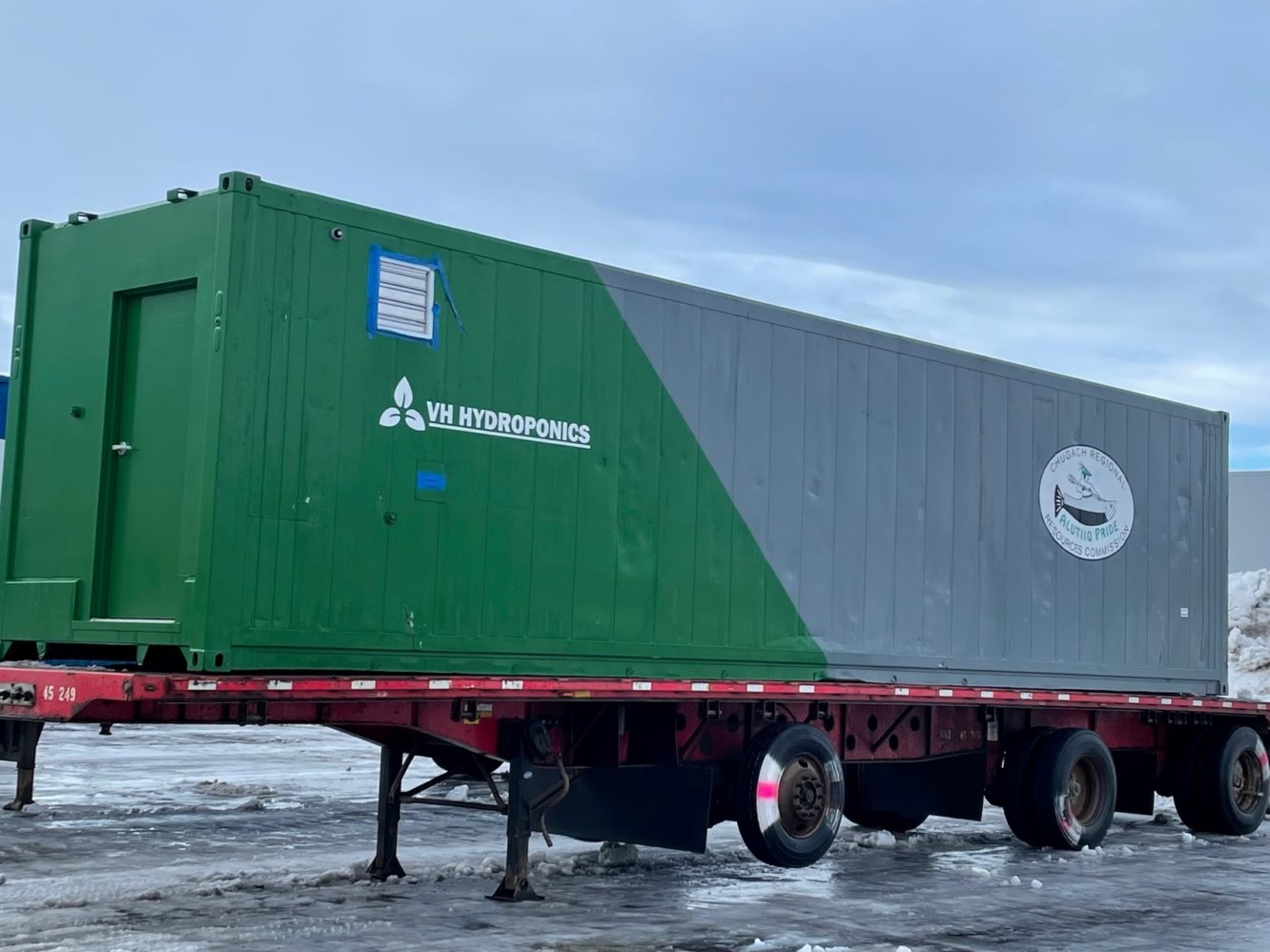After a supreme court decision reaffirmed that Alaska Native Corporations are federally recognized tribal entities, the Coronavirus Aid, Relief, and Economic Security Act (CARES Act) funding was finally released and made available to the Alaska Native community in August 2021. Now, a mere six months later, the seeds of that funding are starting to bear fruit, or rather it’s starting to bear spinach and basil and the potential for other nutritious greens.
“With the CARES Act funding that the CRRC received from Chugach, we focused heavily on food security in the Chugach region,” said Willow Hetrick, CRRC Executive Director. “One of our goals with the funds was to make each of the communities we support less reliant on outside support and turn instead to the store outside their door.”
In this case, ‘the store outside their door’ translates into hydroponics cabinets that can be shipped to villages and produce 20–30 pieces of fresh produce every week, all while operating with a minimal amount of labor. “With these cabinets, tribes will be able to grow anything they wish – lettuce, arugula, dill, peppers, green beans, kale, oregano, thyme and parsley to name a few – but it is best to start out with the easier produce like lettuce and arugula,” Hetrick said. “We’re growing spinach and basil in Anchorage to test the equipment and establish best practices.”
“In total, we purchased seven cabinets and growing equipment for each community. One of these units will reside at the Alutiiq Pride Marine Institute in Seward, so we can train our staff and maintenance contractors to install, operate and maintain the units on behalf of the communities that will call them home. The goal is to end the reliance on outside help.” Once in place, the cabinets will provide a means of circumventing supply chain disruptions and give each community a self-sustaining bounty of greens grown directly on site. In addition, a turnkey, 40-foot connex with six hydroponics systems inside was purchased for the Qutekcak Native Tribe to provide for elder food boxes while at the same time providing for potential economic opportunity for the Tribe or a Tribal member.
Eventually, cabinets will be positioned in Nanwalek, Port Graham, Chenega, Tatitlek, Valdez, Cordova and Seward. This project was made possible by a COVID-19 relief grant that Chugach made available to CRRC. “A team of Chugach employees worked tirelessly to allocate the funds to the regional non-profits and quickly mobilized a grant application portal to facilitate this process,” Hetrick said. “When applying for the funds, we consulted Chugach’s COVID-19 Community Needs Assessment Data Analysis conducted in the Chugach region.”
This analysis allowed for a comprehensive assessment of the major community services and programs that have been disrupted by the COVID-19 pandemic. “Looking at the data, we were able to determine there were extensive interruptions in services; reductions in social gatherings and monthly potlucks which typically provided important sources of nutrition; cancellations of all community learning and cultural classes, luncheons, elder-ride sharing and shopping; access to community shower and laundry facilities; school closures; and a reduction of council services down to essential services.”
From this data, Hetrick and the team at CRRC identified one of the largest threats to the well-being and health of the isolated communities in the Chugach region, an issue that was already prevalent in the remote communities of the Chugach region before COVID-19 but that was only made worse by the pandemic. “Food shortage is always a concern in remote communities, because there are already limited food sourcing capabilities.”
Hetrick and the CRRC team were presented with a number of challenges in bringing their project together to address food shortage. Ultimately, it came down to willing suppliers who went above and beyond to make the purchase of the cabinets and connex and the growing equipment and supplies possible. “There were instances when I thought it wouldn’t happen given the incredibly difficult timeline imposed by Treasury to obligate the funds coupled with global supply chain issues and the Thanksgiving and Christmas holidays,” Hetrick said. “But our suppliers worked with us to make sure we could complete our mission to enable the tribes to be more food secure and have uninterrupted access to healthy foods even during the longest and darkest winter months.”
Hetrick and the entire CRRC team were thankful to Chugach for making the CARES Act funding available. “It’s not often that a non-profit like CRRC is given access to millions of dollars to spend in a matter of weeks,” Hetrick remarked. “In a normal setting, we are competing for years for grant money. With the support from Chugach, we were able to get more than five years of work completed in six months. With Chugach’s support, we have grown as an organization, and most importantly, the tribes are going to benefit immensely when the hydroponics systems arrive in their communities.”
Josie Hickel, Chugach’s Executive Vice President of ANCSA and Community Affairs, was excited to see the CARES Act funding start to make a positive difference in the Chugach region. “When you live in an urban area, fruits and vegetables can be purchased right down the street at your local grocery store. But a lot of our communities don’t have this luxury, so it is incredibility rewarding to see the CARES Act funding that Chugach made available to CRRC spent in such an innovative manner and in a way that has the potential to provide permanent and steady access to healthy food for our shareholders in our remote villages and communities.”

The Chugach Regional Resource Commission (CRRC) is an inter-tribal fish and wildlife commission certified by the Internal Revenue Service as a 501 (c)(3) nonprofit organization. Member Tribes of the Chugach Region include the Tatitlek Village IRA Council, Native Village of Eyak (Cordova), Port Graham Village Council, Nanwalek IRA Council, Chenega Bay IRA Council, Qutekcak Native Tribe (Seward), and the Valdez Native Tribe. There are approximately 1,000 tribal members living in these communities. These people, known as Alutiiq, Sugpiaq, and Eyak, are southcentral coastal people of Alaska. The seven Tribes of CRRC are located in Prince William Sound and Lower Cook Inlet, a remote region limited in travel to small aircraft, charter aircraft and boat travel, with seasonal Alaska marine highway service.
CRRC sees itself as a leader in Tribal Natural Resource issues in Alaska and especially in Southcentral Alaska. Our organization was integrally involved in the research, monitoring, and restoration projects resulting from the Exxon Valdez Oil Spill, working with all Tribes in the oil spilled area. We have since expanded our programs to include playing a leading role in the management of the subsistence harvest of migratory birds, shellfish aquaculture and ocean acidification research, tribal natural resource education, climate change, and food sovereignty.





